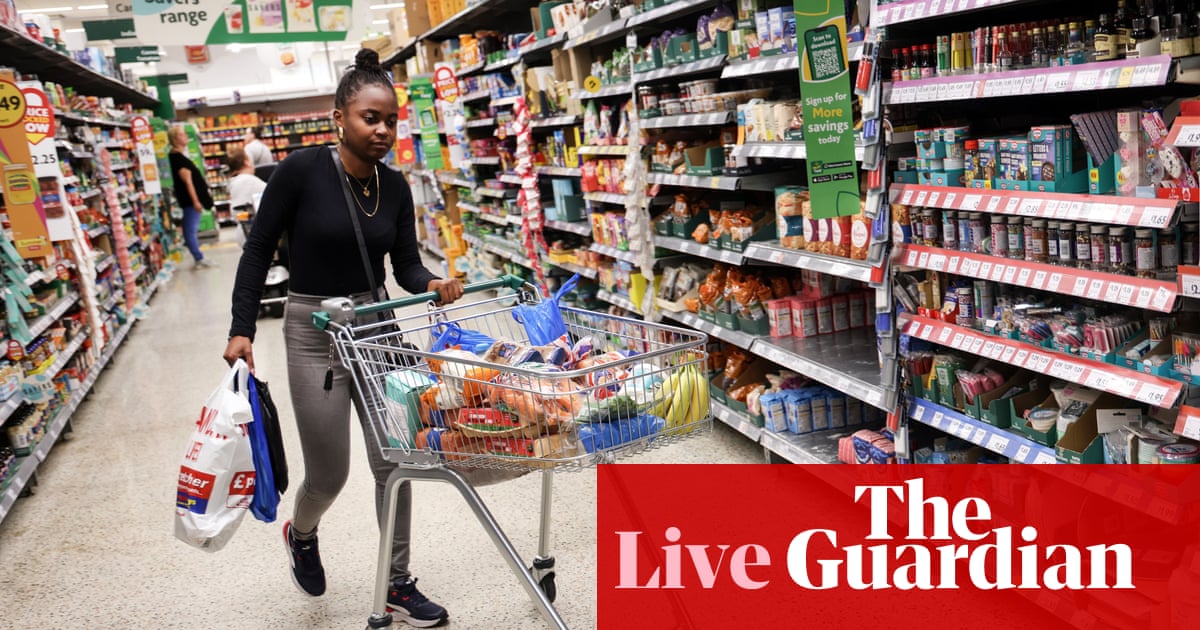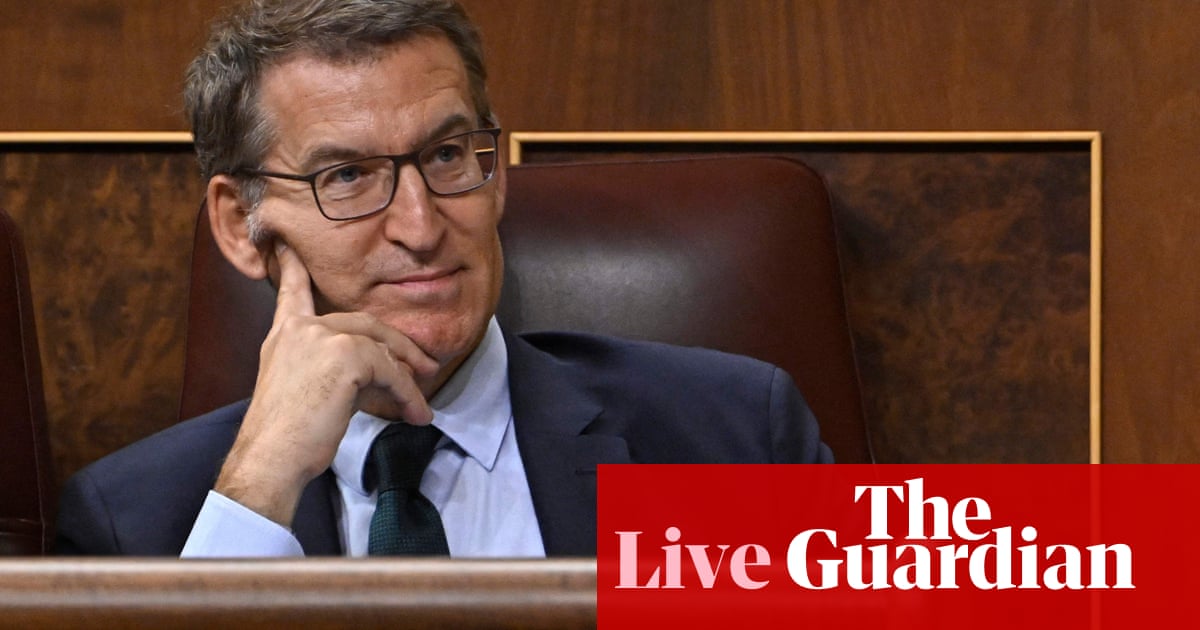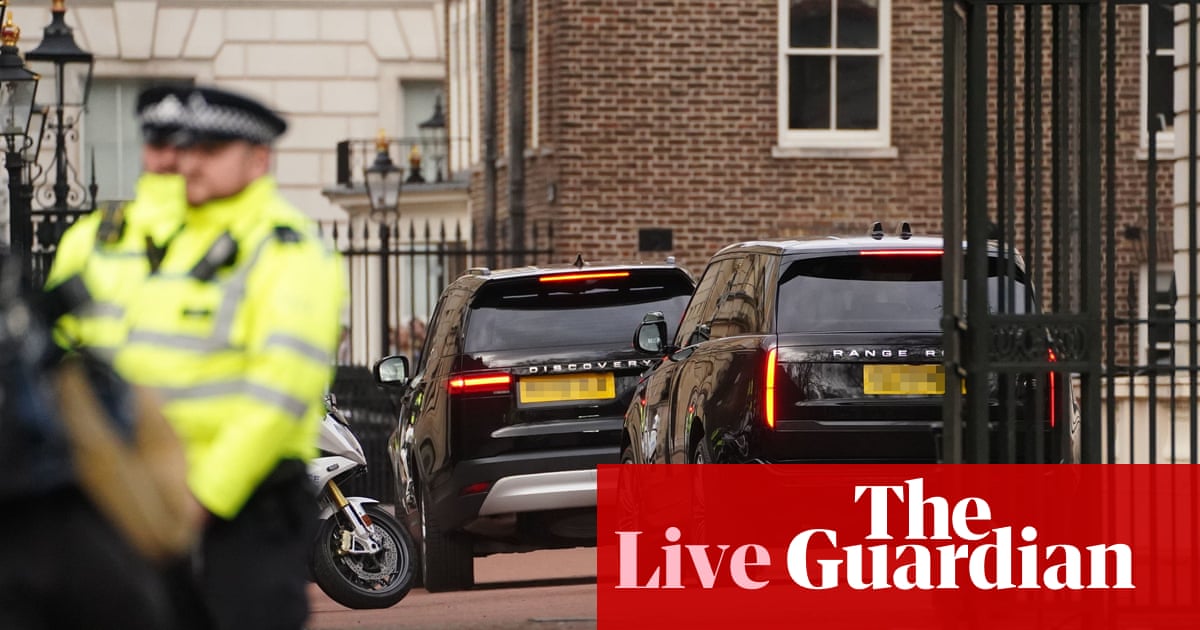
UK has higher inflation in G7
Today’s inflation report confirms that the UK has the highest inflation rate of any G7 country.
Prices are rising slower in other major advanced economies, as this table of the latest CPI inflation rates shows:
US: 3.7% in September
Canada: 3.8% in September
Germany: 4.5% in September
France: +4.9% in September
Italy: +5.3% in September
Japan: +3.2% in August (we get September’s inflation report on Friday)
Some economists have warned that the UK economy suffered a double-whammy. Like the US it has struggled with labour shortages after Covid-19, while it was also hit by the surge in European energy costs after the invasion of Ukraine last year.
Brexit has also been blamed, for creating worker shortgages that pushed up firms’ costs and adding to trade friction at the border, making food more expensive.
Another factor is the UK’s energy price cap, which means bills fall (or rise) on a quarterly basis, with the next drop due in October’s inflation data.
TUC General Secretary Paul Nowak says:
“Bills and prices are still going up - just a bit more slowly than they were a year ago.
“While other countries have acted decisively to reduce cost of living pressures, working families and businesses here remain seriously under the cosh.
“Let’s not lose sight of the bigger picture. The UK is teetering on the brink of recession, with employment falling as companies scramble to cut costs.
“The Conservatives’ lack of a credible economic plan is costing us dear. Britain cannot afford the Tories.”
Closing post
Time to wrap up.
James Smith, research director at the Resolution Foundation thinktank, has warned the government against freezing working age benefits next year, rather than increasing them in line with inflation.
Folliwing this morning’s news that inflation stuck at 6.7% in September, Smith explains:
“Progress on falling inflation has stalled, for one month at least. It should fall sharply next month to below 5 per cent next, as energy prices fall for most people.
“The latest inflation data tells us about the recent past and also shapes cost-of-living pressures on low and middle income households next year, as it normally used to increase benefits in April.
“Should the government choose not to do this, as it has done seven times since 2010, in order to save money, nine million families across Britain will pay a heavy price.
“Families who receive benefits would see their incomes fall by £460 on average, while many low-income families with kids face much higher income losses, rising to £1,200 for a low income couple with two children.”
Charities urge chancellor to lift benefits in line with inflation
Children’s charities are urging the Government to raise benefits at least in line with the latest inflation figures to help families whose finances are being “pushed to the brink”.
A joint open letter to Conservative MPs saw the charities say they are “deeply concerned” by reports the Chancellor Jeremy Hunt might raise benefits by a lower figure – a decision they warned would have an impact on millions of low-income families.
The letter, from Save the Children, the Trussell Trust food bank network, The Joseph Rowntree Foundation, Action for Children, Citizen’s Advice and The Children’s Society, urges Conservative MPs to demand Mr Hunt must “do the right thing” by uprating benefits at least in line with September’s inflation figure.
The organisations will be hoping this happens when Mr Hunt makes his autumn statement on November 22 – although Downing Street has declined to make any commitment, saying there is a process to follow.
European stock markets are continuing to slide, with the UK’s FTSE 100 index now down 95 points or 1.25% at 7579 points.
Michael Hewson of CMC Markets explains:
European markets are on the back foot today as the political temperature in the Middle East ratchets up further in the wake of the hospital bombing in Gaza.
With evidence starting to emerge that Israel may not have been responsible for the blast, the reality is that this may no longer matter given the heat already generated by last night’s horrific events. A lot of people have already made up their minds and aren’t likely to be dissuaded from their initial views which could well mean that it is going to be very hard for cooler heads to prevail.
Sentiment hasn’t been helped by reports of airport shutdowns in France due to terror threats which are weighing on the airline sector with losses for easyJet, IAG, Wizz Air and Ryanair.
In the bond markets, the interest rate on benchmark US government debt is rising.
The yield on 10-year Treasury bonds has risen to 4.889%, the highest since 2007.
That indicates investors are anticipating higher inflation, after the Israel-Hamas war pushed up oil prices today.
Simon Green, head of rates at property firm Gerald Eve, has calculated that UK business rates would rise by £1.7bn next year, if the government uses today’s inflation reading of 6.7% as the benchmark.
He argues that this would be an error, and that the Treasury should not raise business rates by inflation in April.
Leisure, hospitality and retail businesses also face a hit next Spring when the various post-Covid support schemes for the high street will also come to an end.
Green says:
“If the Government were to introduce a 6.7% rise for every ratepayer, at a time when costs are already under enormous pressure, that risks causing further inflation as businesses will have no choice but to pass on the costs to customers.
“Clobbering high streets, retail parks, office blocks and logistics firms with these sky-high rises will also create a significant blow to the economic recovery that everyone wants to see.
“Those in leisure, hospitality and retail are potentially facing a double hit, with a 75% rates relief package worth up to £110,000 per business due to come to an end next year too.
“Chancellor Jeremy Hunt should announce at his budget next month – or even sooner – that the rise in line with inflation will be scrapped and until inflation is back to a more manageable level and to extend the rates relief support for the retail, hospitality and leisure sectors which continue to suffer. This will reassure businesses struggling with rising costs.”
[as flagged earlier, Altus Group estimated business rate bills would rise by nearly £2bn if business rates were raised by 6.7%, a prospect causing alarm in the hospitality sectora and in retail]
Inflation isn’t the only thing eating into UK incomes.
Workers are also facing a higher tax take, partly because the thresholds where higher tax bands kick in have been frozen by the government.
This leads to fiscal drag, where people are pulled into paying more without the government increasing the tax rate.
Bloomberg’s Merryn Somerset Webb has written about it here.
Here’s a flavour:
If the personal allowance had not been frozen since 2021, it would be set to rise to £15,225 in April. It will instead remain stuck at £12,570. The higher rate tax band would start at £60,886 (using numbers from investment platform AJ Bell). Instead it will be £50,270.
This is all very nice for our state finances: the Institute for Fiscal Studies think tank reckons that this stunner of a stealth tax will raise an extra £52 billion for the government by 2027. The results for the average worker aren’t so nice.
Someone who was on the average UK salary of £33,000 at the start of the income tax band freeze will end up paying more than £2,500 extra in tax over the entire duration of the freeze, says AJ Bell’s Laura Suter (assuming average wage increases over the same period).
Those who started on an income of £50,000 are going to feel it even more. If income tax bands had remained inflation-linked they would (again assuming average wage increases) have stayed below the higher-rate band. Now they will not. The result? They will pay £13,000 more in tax over the duration of the freeze.
More here: Tax Inflation Is Squeezing UK Consumers Too
And here’s a chart showing fiscal drag in action, from IFS economist Ben Zaranko.
Over in the US, there are signs that the housing market may be cooling.
Applications for building permits – giving permission to construct a new property – fell by 4.4% in September, government data shows.
That indicates that demand in the construction sector cooled last month, as high interest rates weighed on activity.
However, the number of new construction projects getting under way rose.
Housing Starts rose 7% on a monthly basis in September, after a 12.5% decline in August.
P&G sales boosted by rising prices
US consumer goods producer Procter & Gamble have just illustrated why inflation remains high.
P&G has reported a 6% increase in net sales in the July-September quarter, to $21.9bn.
This was due to a 7% increase in prices, while sales volumes fell by 1% – probably as some customers were put off by more expensive items on the shelves.
Prices of grooming products rose 9%, while ‘baby, feminine and family care’ products, and ‘fabric & home care’ items, both cost 8% more than a year ago.
European stock markets have fallen deeper into the red, as invesors grow more cautious.
The FTSE 100 index index is now down 0.6%, or 47 points, at 7627. Housebuilders are still among the fallers, after Barratt warned the market was tough this year.
Airlines, and jet enging maker Rolls-Royce, are also in the fallers, as tensions in the Middle East weigh on the travel sector.
Germany’s DAX and France’s CAC are both down 0.55%
Bank of America’s latest Global Fund Manager Survey, released this morning, shows that investors have turned bearish again.
Now, 30% of investors fear central bankers will drive economies into a “hard landing”, which is up from 21% in September.
Hoaever, a Goldilocks “soft landing” remains the base case, with 59% of investors expecting inflation to be tamed without a recession.
The FMS also showed investors increasing their cash holdings, a sign of nervousness.
EE to start selling smart fridges, kettles and TVs as the mobile giant moves in on Amazon, Currys and Argos
BT-owned EE is to start selling smart TVs, fridges, kettles and fitness products as it looks to move beyond its roots in smartphones and enter an e-commerce market dominated by brands such as Amazon, Currys and Argos.
The mobile operator, which has 25 million subscribers, is seeking to leverage its experience selling telecoms products and services moving into categories including smart home security, insurance and games consoles to all UK consumers.
EE, which is replacing BT as the telecoms giant’s consumer masterbrand for the future, has felt emboldened to move into selling consumer electronics after seeing significant success with games consoles such as Xbox and Playstation.
Marc Allera, the chief executive of EE, says that it felt confident it could move into selling other products after becoming a “top 3 or 4 retailer” of games consoles, as well as being the UK’s biggest smartphone retailer.
“We are taking our learnings from selling smartphones - spreading purchase payments, cheap finance, offering bundles and connectivity services - and are bringing that to other categories starting with consumer electronics. The real drive is not necessarily selling a lot of smart kettles, it is about becoming a more relevant brand for consumers for the future.”
The mobile operator is set to open up its app and website as a sales hub for all UK consumers to be able to use, through the creation of an individual EE ID that operates in a similar fashion to logging in with Apple or Google, and is backing “new EE” positioning with the largest ad campaign since the brand was launched in 2012.
“We are playing with what the brand can become,” said Allera. “Innovation in telecoms has been minimal for the last few years. We are the UK’s largest subscription business and opening up to everyone is us reinventing what the role of a telco is for the future. Some things will work, some won’t work.”
Sacha Lord, the Night Time Economy Adviser for Greater Manchester, is urging the government not to raise business rates next April by today’s inflation reading (as experts fear will happen, see earlier post).
Lord explains:
“The unchanged CPI inflation rate released today will create further pressure on all small businesses, especially those in hospitality.
“We have seen the effects of inflation and resulting decreased discretionary spending on the sector over the past 12 months, and today’s news will result in these difficulties continuing.
“While some venues may seem busy, especially those trading in city centres, we have to note that many sites have already altered business plans, reduced opening hours to reflect decreased turnovers, or withdrawn planned expansion or investments entirely.
“It is in the interest of the growth of the UK economy that the Government intervenes to halt any further financial pressures on the hospitality sector, including a rethink on inflation-linked tax increases and the planned removal of the current business rates relief package from April.”
Today’s UK inflation report hasn’t had much impact on City expectations for next month’s interest rate decision.
The money markets currently indicate a 78.5% chance that the Bank of England leaves its benchmark rate at 5.25% in November, up from 76% last night.
Stephen Payne, portfolio manager at Janus Henderson Investors, explains why investors don’t expect a hike next month:
“UK CPI came in at 6.7% this morning, flat on the month compared to August, so a pause in the downtrend. Economists’ forecasts were for 6.6%, so the number was marginally ahead of expectations.
However, it is still below the Bank of England’s forecast and so unlikely to push the MPC into a hike at their next meeting. Market reaction has been minimal with rate expectations unchanged, whilst 2-year gilt yields briefly moved a little higher before unwinding that move. Petrol prices were the key driver of the higher number but interestingly food and beverage prices actually fell month-on-month.
The October print will be notable, as the spike in energy bills last year drop out of the comparison base, so a sharp fall in inflation can be expected in October to somewhere around 5%.”
The NIESR research institute says the UK’s food inflation rate of 12.1%, down from 13.6% in August, is concerning.
They say:
“There is no government support to help households (especially lower income households, who spend a greater part of their incomes on food) offset this cost.”
NIESR also warns that underlying inflationary pressures “remain elevated”, and are generating “persistence” in the headline rate of inflation.
Analysts at RBC Capital Markets predict the Bank of England’s monetary policy committee (MPC) will not raise UK interest rates higher, despite inflation failing to drop last month.
They told clients this morning:
Since the MPC’s decision to hold rates in September we have argued that it would take a significant upside surprise in the data for them to restart their hiking cycle.
Today’s data doesn’t represent that ‘significant upside surprise’ to our minds. Indeed we’d argue that compared with the MPC’s expectations it doesn’t really represent a ‘surprise’. We continue to see the MPC holding Bank Rate from here.
Back in the UK, we are just “one wrong move” away from a recession, warns Michael Field, senior equity strategist at Morningstar, after this morning’s inflation report.
“The news that UK CPI didn’t fall in September will disappoint the market today. At 6.7%, inflation in the UK remains high, much higher in fact than the Bank of England’s target rate of 2%. The good news in the release was that core inflation fell by 0.1% to 6.1%, so some relief for consumers, but not much.
“Optimists will point to the large fall that should come next month, when we come to the one-year marker of the Ofgem cap on energy prices. This should knock a good 1% off headline inflation, but again if we focus on that core component, it likely won’t shift. Further, the danger is that getting core inflation down from here to anywhere near 2% may take years, not just months.
Why is this a problem? Well, it poses a dilemma to the Bank of England, stubbornly high inflation means that they will likely keep interest rates high. Running high interest rates with a weak economy is a tight-rope act, one wrong move and we are in a potentially damaging recession.












